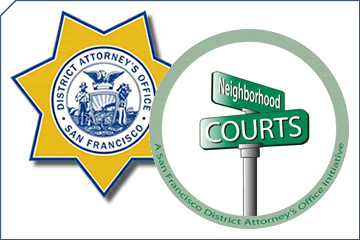 I recently sat in on two cases at the Neighborhood Court in the Taraval. There were two adjudicators, Robert Jung and Cathy Russo. Lisa Wood, a case manager and Susan Stone, a restorative justice trainer, both from Pre-Trial Diversion were also there.
I recently sat in on two cases at the Neighborhood Court in the Taraval. There were two adjudicators, Robert Jung and Cathy Russo. Lisa Wood, a case manager and Susan Stone, a restorative justice trainer, both from Pre-Trial Diversion were also there.
The first case involved a young man who was 19 years old. He was involved in a theft incident. When he learned the police were called by the store security, he pushed and struck the security guard and fled. He was captured outside by other security guards. The adjudicators asked questions about his thought process and his educational background. He had to acknowledge his misdeeds and explain why he did what he did. The adjudicators decided to have him do community service and attend a young adults group to help him make better decisions.
The second case involved a 43-year-old man who was caught shoplifting. He took full responsibility and was very remorseful for his actions. He explained that at that time he was having major problems in his life. He has since secured a full-time job and things are looking better for him. He was given community service.
One thing I noticed is that for the person charged with the crime that this is very personal and intimate.These people really had to bare their souls to the adjudicators and the Pre-trial Diversion workers. If thepeople do not complete their community service or workshop commitment or is arrested within one year,the original charges are reinstated and the cases go to the district attorney’s office for criminal prosecution.
Neighborhood Courts is a program that gives Taraval residents the opportunity resolve usually non-violent crimes in their neighborhood. The adjudicators are residents who volunteer to hear cases in a neighborhood setting using restorative justice. The volunteer adjudicator can direct participants to do community services, pay restitution, attend mediation with the victim, or get treatment for issues such as anger management or substance abuse. Adjudicators are trained to administer the neighborhood court, coordinate with service providers, and track cases.
When a person is cited for a misdemeanor or infraction, the person must agree to participate in Neighborhood Courts. Their citation is discharged. The Neighborhood Court process is a voluntary program and the hearings are non-criminal.
If you are interested in becoming an adjudicator, go to the district attorney’s website or contact Jackson Gee at jackson.gee@sfgov.org.
